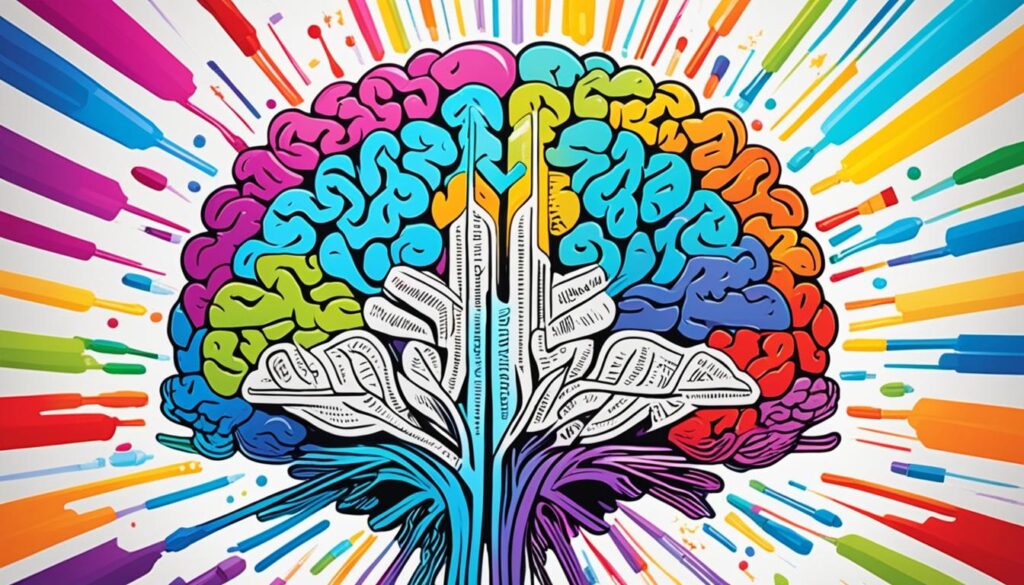Scientific research shows that being thankful has big impacts on our happiness and mental health. Being grateful can lead to a life that’s happier and more satisfying. Gratitude is closely connected to how well we do in areas like our relationships and how we feel emotionally and mentally1. It’s been proven that feeling and showing thanks predicts a better life and more happiness1.
Gratitude goes beyond just saying “thanks.” It’s truly appreciating the good stuff in our lives, no matter how small. This thankfulness helps us see all the kinds of help we get and then we feel like helping out too. It starts a chain reaction of positive feelings1. Plus, when we’re grateful, everyone around us, as well as our society, benefits1.
Gratitude’s effects reach farther than only making us personally happy. Studies show that being grateful is linked to feeling good, being happy with life, having a friendly nature, and forgiving others. It’s also tied to lower chances of using drugs and feeling overly worried or stressed1. Also, being thankful seems to lower anxiety and sadness, making it a strong tool for our mental health1.
Keeping a gratitude journal is a great way to be grateful. Writing down what we’re thankful for each day can boost our happiness by more than 10%. This simple practice not only makes us see the good in life but also makes us pause to think and change how we see things. It has a really good effect on how we feel about ourselves too2. And, it can make us feel happier, keep us in good spirits, and even help our bodies stay healthy3.
Gratitude changes how we act around others for the better. People who are grateful often end up being kind and doing things to help others. This not only makes personal relationships better but also helps in friendships and family ties, especially when things are tough23. Also, being thankful at work can make staff happier and less likely to leave2.
In summary, gratitude benefits us, those around us, and society itself. Getting into the habit of being thankful, like through a journal, can make us happier, healthier, and better connected. So, daily, take the time to be thankful and enjoy the many rewards it brings.
Key Takeaways:
- Practicing gratitude has significant positive effects on mental health and overall well-being1.
- Gratitude journaling enhances long-term happiness and improves psychological well-being and self-esteem2.
- Gratitude strengthens relationships, promotes prosocial behavior, and contributes to a compassionate society23.
- Gratitude has an inverse relationship with anxiety and depression, making it beneficial for managing mental health1.
- Regular gratitude practices can improve workplace dynamics and reduce turnover2.
The Health Benefits of Gratitude
Being grateful is more than just saying thanks. It boosts our health in many ways, helping our mind and body.
Research shows a strong link between feeling thankful and being less sad. People who are grateful tend to feel happier, have better relationships, and think highly of themselves4.
Taking time to be thankful fights off bad thoughts by focusing on the now. It can make a big difference in how we see things, making us healthier in mind. It also cuts down on feeling blue and worried, which is great for mental health5.
Gratitude does good for our bodies too. For example, jotting down what we’re thankful for can lower our blood pressure. This is super for the heart’s health4.
Being grateful doesn’t just affect our minds and hearts. It also changes our body processes. It helps to calm our nerves, making us feel more at peace. This is key in fighting stress and staying well-rounded4.
Moreover, when we’re thankful, we sleep better, feel happier, and get sick less often. Gratitude improves all these aspects of health, making us thrive6. Thinking about good things before bedtime makes our sleep deeper. It also makes us feel good about life and friends, bringing more peace to our sleep4.
To sum up, being grateful boosts health in many ways. It makes our minds brighter, our hearts happier, and our bodies stronger. Embracing gratitude can truly change our lives for the better.
The Role of Gratitude in Mental Health
Research shows that being thankful greatly affects mental health. It helps lessen depression and anxiety7. Grateful people often feel more satisfied with life. They form stronger relationships and are more confident7. Gratitude shifts focus from bad thoughts to a more positive life view.
Gratitude in the workplace boosts teamwork and job quality8. It leads to more eager workers, willing to do extra and work better as a team7. This makes a better workplace for everyone, improving job happiness and dedication.
Gratitude also improves personal and friendly relationships. Thankful partners and friends trust each other more and are happier8. It strengthens the bond and makes the relationship healthier and lasting.
Feeling thankful might also change our brains. It can improve our ability to understand others7. This makes us better at socializing and understanding people, which helps mental health.
Thanks can also help in therapy. Adding gratitude letters to counseling can make people feel better sooner than just talking about troubles. It also eases physical pain and makes people cooperate more with health treatments7.
Research suggests that gratitude leads to many mental health benefits. Less stress, better sleep, and stronger minds are possible with gratitude98. It triggers happiness hormones and builds new brain connections, enhancing our well-being.
Clearly, gratitude is a big player in mental health. Making gratitude a habit in our daily life brings many mental and emotional perks.
The Psychological Benefits of Gratitude Letter Writing


Gratitude letters can do wonders for your mental health. Those who wrote them felt better than those who didn’t10. By putting thanks into words, your mind focuses less on bad stuff. It makes you see the good and feel supported by others. This can make you happier now and in the future10.
This practice is simple to start. Just think of things or times that make you grateful. Then, thank the people or moments that made them happen10. Doing this for a month boosts your joy and lessens sadness10. Putting gratitude into words turns good feelings into a strong sense of wellness.
Experts in positive psychology highly recommend writing these letters10. Studies back this up, showing it makes you feel happier and healthier. It taps into skills like love and understanding10. Being thankful regularly shows you’re good at those things. So, writing these letters makes you even better and happier.
Telling others how thankful you are improves your life in many ways10. It makes you more optimistic and social. Plus, it’s good for your health and makes you feel less anxious and down10. Writing these letters spreads kindness and makes you more connected with others. It’s a small action that can have a big positive effect on you.
Gratitude’s Effects on Brain Activity
Studies using fMRI show gratitude affects our brain in a lasting way. People who practice gratitude, like writing thank-you notes, show more brain activity in areas tied to learning and choice making, especially the medial prefrontal cortex11. This means being thankful can help our brains better understand and hold onto gratitude, which boosts mental health.
Gratitude goes beyond just making us happy. It also changes our brains physically. Science has proven that being thankful triggers the release of “feel-good” chemicals, dopamine and serotonin11. These are key in controlling our mood and happiness.
Feeling thankful can even lower stress levels by cutting down on cortisol, a stress hormone11. This is huge for mental health because stress often leads to anxiety and depression.
Saying thanks helps us think more positively. It can shift our mental habits from negative to positive11. Doing this can make us stronger and happier, lowering the chances of mental health issues.
Gratitude improves the wiring in our brain for positive feelings11. In turn, it helps us manage our emotions better, making room for more happiness and joy.
Gratefulness activates important brain regions linked to mood and choices11. So, being grateful can make our minds work better, beyond just feeling good.
People who are thankful sleep better and longer11. It could be because feeling grateful helps us relax and feel less anxious before bed.
Being thankful might make us physically healthier, too. Those who often give thanks tend to get sick less and recover quicker11.
And it’s not just the mind that benefits. Gratitude might also make physical pain feel less intense, useful for those with ongoing pain11. It could be because the brain processes positive experiences differently, affecting how we feel pain.
Grateful folks are usually more caring and less likely to start fights. This can make our relationships stronger and our social lives brighter11.
Thanking others can improve how we talk and connect with one another11. Appreciating those around us can build closer ties, helping us feel supported and belong.
Lastly, gratitude can help us feel like we’re part of a bigger group, less alone11. It nurtures a sense of community and understanding among people who practice it.


Gratitude and Physical Health Benefits
Being grateful does more than make us feel good. It’s been shown to boost our physical health as well. Many studies have linked being thankful to better health, showing why it’s good to be grateful every day12.
A study on 962 adults in Switzerland found a strong link between feeling grateful and better self-reported health12. This means those who are often thankful tend to be healthier.
Gratitude’s power on health is helped by good mental health and doing healthy things, and being ready to seek help12. These things help connect being grateful to better health, showing its overall impact.
Age also matters in how gratitude affects us. It seems being thankful indirectly helps more with mental health and healthy habits in older people12. So, gratitude might be more beneficial as we get older.
On top of this, feeling thankful helps keep us connected to others. It makes our social ties stronger, which is good for our health. Feeling like we belong lowers stress and encourages us to live healthier12.
In the end, being grateful is a great way to handle tough times. It builds a mental strength that keeps our spirits high. This positive attitude, thanks to gratitude, supports our physical health too. So, embracing thankfulness can do wonders for both mind and body12.


Cultivating a Gratitude Mindset for Physical Health
Getting the health benefits of gratitude starts with a simple habit. Try writing three things you’re thankful for every day in a journal. Also, say thanks to people and do kind things. This not only improves your mood but also strengthens your connections with others13.
Adding gratitude into your routine can really change how you feel. Take a moment every day to think about what you’re grateful for. This can help you build a thankful mindset. Such a mindset doesn’t just boost your health but also adds to your happiness13.
Cultivating a Mindset of Gratitude
Cultivating gratitude brings happiness into our lives. By regularly being thankful, we notice and enjoy positive things around us. This helps us see and count all blessings, even the tiny ones.
A study by Barry, Folkard, & Ayliffe (2014)14 shows the benefits of a positive mind. This includes being happy, confident, stable, motivated, and hopeful. With practice, we can keep a positive attitude through gratitude.
A great way to start is with a gratitude journal. Writing down what we’re thankful for each day reminds us of life’s good parts. It might be people we love, nature’s beauty, or success we’ve achieved.
Fredrickson et al. (2008)14 found that a certain meditation boosts feelings of love and kindness. This can lead to a more positive outlook. Focusing on gratitude and spreading love makes us more open to good things.
Benson & Friedman (1996)14 suggest thinking positively brings positive results. By imagining the best, we look at life’s hurdles with hope. This leads to tackling challenges with a thankful heart.
Setting and working towards meaningful goals is also key. Emmons (2003)14 says it improves focus and builds a positive attitude. Achieving our goals makes us thankful for progress and the journey.
Practicing optimism and thankfulness can change how we see life. Sharing gratitude with others is powerful too. It deepens connections and creates a circle of positivity.
Focusing on gratitude makes us notice the good in our lives. It boosts our happiness and makes us appreciate kindness. Instead of seeing the bad, we see the good in life.


The Impact of Gratitude on Well-being
Being thankful often can really make us happier. It makes us feel more satisfied with our lives and look at the future with hope. We feel closer to other people and experience more joy. By being grateful, we also want to help those around us more.
Gratitude also changes how we view life. It helps us focus on what’s good instead of the bad. This positive perspective makes our lives feel richer and more rewarding.
Grateful people are healthier too. They often have less physical pain, sleep better, and are less stressed. Their hearts also work better15. Mentally, they are happier, less anxious, and feel better about themselves15. Gratitude helps them get along better with others and care more about their feelings15.
“A study by Emmons & McCullough (2003) found that gratitude can have a positive impact on subjective well-being in daily life”15.
There are even brain benefits from being thankful, as Chowdhury’s study points out15. The article suggests several ways to be more grateful, like keeping a journal and being mindful. These strategies can make us feel happier and more connected15.


Studies have shown thanking others really does make us feel better. In one, over a thousand people were asked to think about gratitude. Those who did felt happier, more satisfied with life, and less sad16. These results show the real impact of being thankful.
Many young people already understand the power of thankfulness. Nearly 70% say they thank others a lot17. Science backs this up, showing how gratitude boosts our well-being and strengthens social ties and health17. This information tells us just how important it is to be thankful for a good life.
Gratitude is a powerful force for better health and happiness. It makes us see the good in our lives and in others. By making gratitude a habit, we can see many improvements. We feel more positive and our lives become more rewarding and fulfilling.
Gratitude as a Coping Strategy
Gratitude is a powerful coping strategy for stress. It shifts focus to the good things in life. This shift helps people move away from stress and negative feelings. Gratitude builds strength against tough times. It shows that happiness doesn’t just come from what’s outside us. Instead, it comes from within, in finding the good in every situation.
“In a 2007 study, researchers found that more grateful people were more likely to actively deal with their problems or try to look for ‘silver linings’ compared to less grateful people. Additionally, grateful individuals were less likely to disengage from problem-solving or blame themselves for their issues”18.
A 2009 survey of college students found this too. Those who began the study feeling more gratitude tended to look at stress in a positive light over the next month18.
Research by Nathan Deichert and others discovered that grateful people reach out for help more. They do this when facing stressful situations18.
In 2019, a study confirmed that writing about gratitude helps regulate emotion. This means people get less upset by negative events18.
Another study found that focusing on gratitude makes people better at resisting short-term rewards. They tend to choose benefits that come later, showing better control over their impulses18.
In summary, thankful individuals are more likely to use healthy ways to cope. They also seek support from others during hard times and are more patient for future rewards18.
Gratitude and Relationship Building
Gratitude is key in making and nourishing connections. When we show thanks to others, it makes our bonds stronger19.
It’s a simple way to say we value our families, friends, and co-workers. Doing this helps build a positive setting. This leads to better, more meaningful relationships19.
Studies prove thankfulness is vital for happy relationships. One research involved over 315 people. They were told to show more gratitude. The result? Their bonds improved a lot20.
When we thank others, we see the bright spots in our relationships. This makes us love and understand our partners more21.
Gratitude also lowers fights and unhappiness in relationships. Those who show thanks often are more likely to be committed and trustful. They are happier in their love lives21.
Plus, being thankful makes both people feel good. The one thanked feels valued. This makes them bond closer. It also inspires more kindness and help20.
In the end, being thankful every day changes our ties with others. It makes our relationships more solid and rich. This is true for our family, friends, and workmates19.
Cultivating Gratitude for a Compassionate Society
Cultivating gratitude brings benefits for all. It helps spread kindness and a positive outlook in our towns. Gratitude makes each person feel connected and care for others.
Studies show that being thankful can make us happier and more satisfied with life2223. It can also lower stress and feelings of sadness, making our minds healthier2324. Gratitude boosts how we see ourselves, helps us concentrate, and raises our confidence24.
When we practice being grateful, we start seeing the good even in tough times23. This change in view can help us stay hopeful and strong, even in hard times. Grateful people are more patient, kind, and willing to help others24. This strengthens friendships and spreads positivity around.
To sum up, being thankful is key to a kind society. When we thank and notice good things, we make the world better. Let’s use gratitude to bring joy and understanding to all we meet.
FAQ
How does practicing gratitude enhance mental wellness?
Studies show that dedicating 15 minutes a day to gratitude can make us feel better. After six weeks, we can notice a change in how we see things. Gratitude lessens depression and anxiety, helps the heart, lowers stress, and makes us sleep better.
What benefits does gratitude have on mental health?
Being thankful can make us less sad and worried. It fights bad thoughts and makes our hearts healthier. Grateful people sleep well, lead a healthy life, and are less stressed. They also find calm in good experiences and lasting memories
How does expressing gratitude in writing improve mental health?
Writing ‘thank you’ letters brings many mental health pluses. Those who jot down their gratefulness feel better and happier than those who don’t. It turns our minds from the negative to the positive, spurring a love for life. These effects can stay with us for a long time.
What effects does gratitude have on brain activity?
Brain scans show that being thankful truly affects our brains. For example, writing ‘thanks’ makes our brains better at learning and making choices. This means gratitude makes our brains snap to attention for positive thoughts, improving our mental well-being.
How does gratitude impact physical health?
Gratitude has real physical health benefits. It removes headaches, tiredness, and pushes us to work out. Feeling thankful makes our relationships stronger, and we feel more connected. It’s a great way to deal with bad times, too.
How can one cultivate a mindset of gratitude?
Getting into the groove of being grateful needs practice. Every day, write down or think about what makes you thankful. Turn bad vibes into good ones and share thanks with others. This makes you appreciate kindness more and boosts your happiness.
What impact does gratitude have on overall well-being?
Gratitude really boosts our well-being. It makes us love life and think positively about the future. Being thankful connects us with others, making us joyful and eager to help. It shifts our focus to what’s good in life, making everyday bright and fulfilling.
How can gratitude be used as a coping strategy?
Thankfulness is a great way to handle stress. Seeing the good in life shifts our focus from tough times. It makes us strong and shows happiness comes from inside. Gratitude reminds us there’s good in every situation, encouraging us to thank and help others.
How does gratitude impact relationship building?
Thanking others makes our relationships stronger. It bonds us closer and makes us all feel supported. By sharing thanks with those we love and care about, our life feels positive and richer.
How can gratitude help cultivate a compassionate society?
Being thankful makes society kinder and more supportive. It fights negativity and encourages helping. It shows we’re all connected, making our world a better and caring place to be.
Source Links
- What is Gratitude and Why Is It So Important? – https://positivepsychology.com/gratitude-appreciation/
- Benefits of Gratitude: 28+ Surprising Research Findings – https://positivepsychology.com/benefits-gratitude-research-questions/
- 14 Benefits of Practicing Gratitude (Incl. Journaling) – https://positivepsychology.com/benefits-of-gratitude/
- Health benefits of gratitude – https://www.uclahealth.org/news/article/health-benefits-gratitude
- How Gratitude Changes You and Your Brain – https://greatergood.berkeley.edu/article/item/how_gratitude_changes_you_and_your_brain
- Feeling grateful improves health – https://www.mayoclinichealthsystem.org/hometown-health/speaking-of-health/can-expressing-gratitude-improve-health
- The Neuroscience of Gratitude and Effects on the Brain – https://positivepsychology.com/neuroscience-of-gratitude/
- Can Expressing Gratitude Improve Mental Health – https://lakepointrecovery.org/news/can-expressing-gratitude-improve-your-mental-health
- Effects of gratitude intervention on mental health and well‐being among workers: A systematic review – https://www.ncbi.nlm.nih.gov/pmc/articles/PMC8582291/
- Letters of Gratitude: How to Write a Message of Appreciation – https://positivepsychology.com/gratitude-messages-letters-lists/
- The science of gratitude and how it can affect the brain — Calm Blog – https://www.calm.com/blog/the-science-of-gratitude
- Examining the Pathways between Gratitude and Self-Rated Physical Health across Adulthood – https://www.ncbi.nlm.nih.gov/pmc/articles/PMC3489271/
- Expressing Gratitude Has Physical Health Benefits As Well As Emotional Benefits – https://www.forbes.com/sites/traversmark/2020/11/27/expressing-gratitude-has-physical-health-benefits-as-well-as-emotional-benefits/
- 9 Ways to Cultivate a Positive Mindset – https://www.psychologytoday.com/us/blog/click-here-happiness/202105/9-ways-cultivate-positive-mindset
- The Impact of Gratitude on Well-Being – https://www.urmc.rochester.edu/behavioral-health-partners/bhp-blog/april-2022/the-impact-of-gratitude-on-well-being.aspx
- Positive Psychology and Gratitude Interventions: A Randomized Clinical Trial – https://www.ncbi.nlm.nih.gov/pmc/articles/PMC6437090/
- Gratitude and well-being: A review and theoretical integration – https://greatergood.berkeley.edu/images/uploads/Wood-GratitudeWell-BeingReview.pdf
- Four Ways Gratitude Helps You with Difficult Feelings – https://greatergood.berkeley.edu/article/item/four_ways_gratitude_helps_you_with_difficult_feelings
- The Role of Gratitude in a Positive Psychology Group Intervention Program Implemented for Undergraduate Engineering Students – https://www.ncbi.nlm.nih.gov/pmc/articles/PMC10295172/
- Frontiers | Positive Psychology and Gratitude Interventions: A Randomized Clinical Trial – https://www.frontiersin.org/journals/psychology/articles/10.3389/fpsyg.2019.00584/full
- Positive Psychology – Gratitude – https://changetherapy.org.uk/2023/05/28/positive-psychology-gratitude/
- Four Great Gratitude Strategies – https://greatergood.berkeley.edu/article/item/four_great_gratitude_strategies
- Gratitude – https://accelerate.uofuhealth.utah.edu/resilience/gratitude
- Gratitude: The Benefits and How to Practice It – HelpGuide.org – https://www.helpguide.org/articles/mental-health/gratitude.htm
